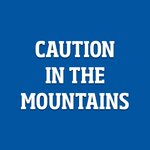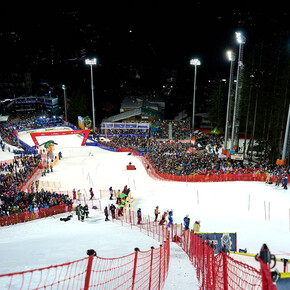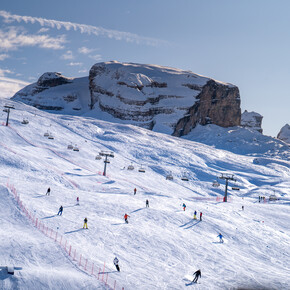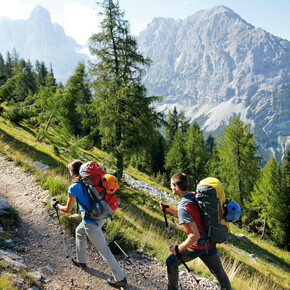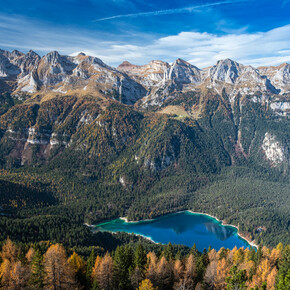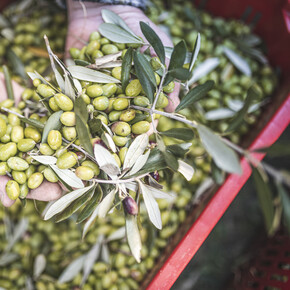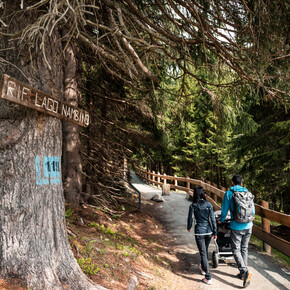THE STORY OF THE LAND CONTINUES AT THE TABLE
These are the three pillars of Trentino's agricultural and food industry, which are joined by more niche specialities and authentic delicacies for foodies, from mountain honey to craft beer
Flavours and aromas that draw on ancient traditions and knowledge, in oenology, cheesemaking and fruit growing. Wines, malga cheeses, apples and berries, trout and Arctic char bred in pure stream waters, and many more culinary delights from Trentino tell the story of this land without the need for words, while respecting nature and sustainability.
The pure air of the Dolomites and the distinctive mountainous topography make Trentino a unique environment for wine production, giving the wines special aromas: the result is one of the most important mountain winegrowing areas in Italy and Europe.
Equally worthy of note is the presence of representative wines such as the native Nosiola, from which Vin Santo is also made, in the Valle dei Laghi, Marzemino in Vallagarina and Teroldego in the Piana Rotaliana, which boast the Trentino DOC appellation, as well as Müller Thurgau, which has found its ideal habitat in the Val di Cembra.
Any time is the right time for a toast with mountain “bubbles” made in Trentino, with a Trentodoc sparkling wine, which is not only excellent as an aperitif, but also to accompany dinner. This internationally renowned product perhaps describes this province, its nature, its environment and its mountains better than a thousand words. While it often only takes a few months to produce a still wine, for Trentodoc – a classic method sparkling wine – a much longer period is required, ranging from a minimum of 15 months, as stipulated in the specifications, up to 10 years for a grand reserve. The Trento Doc Institute, established in 1984, is responsible for protecting the quality of the production method of these sparkling wines.
Then there’s grappa to warm the soul and strengthen friendships in front of an open fire. There are three main types: those made from aromatic grapes, those intended for ageing and those derived from mixed marc, all with the guarantee of the Trentino Grappa trademark.
About 70,000 quintals of milk are produced in the alpine pastures of Trentino, a high quality food because is produced in the mountains, in alpine meadows, where the animals feed, every day, only on fresh grass, flowers and water. It is an authentic, genuine world, as are the products it generously offers – besides quality fresh milk, butter and cheese – behind which lies the experience, passion, manual labour, attention and hard work that herdsmen and farmers put in every day in the more than 300 alpine pastures farmed. The jewel in the crown of Trentino cheesemaking is Trentingrana, which, together with Puzzone di Moena, Spressa delle Giudicarie and Vezzena degli Altipiani Cimbri, has obtained PDO status. Casolèt della Val di Sole, Tosela and Botìro del Primiero butter are Slow Food Presidia.
Tasty, juicy, healthy and nutritious, Trentino apples, grown in most of the province, are the emblematic fruit of this area. Particularly famous are those from Val di Non, where the climatic conditions, the exposure of the land and the soil characteristics are the elements that give this fruit its unmistakable flavour, crunchiness and fragrance. In particular, the natural brightness of these valleys, with more than 2,500 hours of sunshine a year, ensures perfect ripening; the “Mela Val di Non” was the first, and so far only, Italian apple to receive European PDO recognition. Many varieties are cultivated, but three stand out above the rest: Renetta Canada, rich in antioxidants and very good cooked (the variety used to make the famous Strudel); Red Delicious (the well-known “Snow White apple”), perfect at the end of a meal or munched as a snack; and the crunchy Golden Delicious, which is the apple par excellence, being the most cultivated variety in Europe and the favourite of Italian families. A protected geographical indication (PGI) has also been added to the European Union’s register of designations of origin for eight Trentino apple varieties: Golden Delicious, Red Delicious, Gala, Fuji, Morgenduft, Renetta, Granny Smith and Pinova. All these apple varieties have specific quality parameters defined in detail in the specification. The average annual production is about 500,000 tonnes.
The northernmost olive trees on the planet
Not far from the lofty peaks of the Dolomites, around the shores of Lake Garda, at the 46th parallel north, the beneficial breezes of the Benaco area, especially the Óra, create a unique microclimate. The effect is a Mediterranean oasis nestled in the Dolomites that for centuries has been home to the northernmost olive-growing area in the world, and that, thanks to innovative production methods, now gives us a highly prized, premium quality extra virgin olive oil.
There are two aspects that make Garda Trentino extra virgin olive oil special. The first is taste, the second is terroir: here, the olive groves are a cultural asset handed down from one generation to the next by responsible, forward-thinking growers.
Increasingly organic
Organic production now accounts for 6% of Trentino’s total agricultural output, thanks to the 1,214 workers in the sector and an area of 18,266 hectares under organic cultivation. The main areas of production include soft fruits, other fruits and vegetables and medicinal plants, vineyards, forage and pasture. The province is already home to four Organic Districts – geographical areas where farmers, citizens, tour operators, associations and public administration bodies enter into an agreement for the sustainable management of local resources, based on an organic model of production and consumption. Interesting fact: the largest agricultural municipality in Trentino is the capital city of Trento, with around 1,500 hectares under cultivation. It is a vast cultivated area, not only with vines, and, most importantly, it is a social and agronomic environment with a keen focus on organic farming: indeed, 30% of the provincial capital’s production is certified organic.
